Mentoring excels when students help students
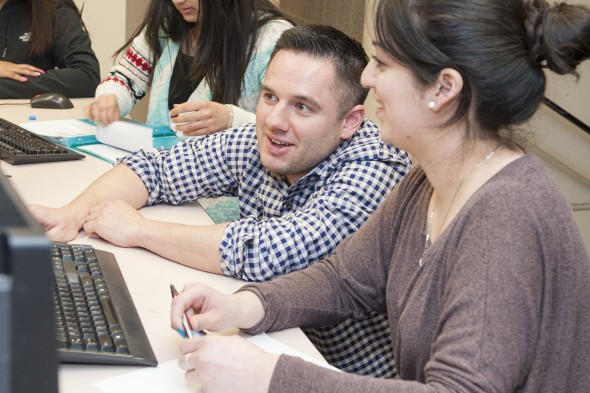
To be successful in college, you need enthusiasm and attitude, says Sean Lee. Photo: Roberta Dupuis-Devlin
As a first-generation student, Sean Lee wasn’t sure what to expect when he started college.
“I thought I had to fit a certain mold to be successful,” said Lee, a fourth-year doctoral student in public health. “My best mentors taught me to investigate my own interests. To be successful, you can come from any background. Enthusiasm and attitude is pretty much all it takes.”
Lee, who shares this advice with the undergrads he mentors, is among five graduate student winners of the 2015 UIC Excellence in Undergraduate Mentoring Award. Now in its third year, the award is given by the Honors College and Graduate College to outstanding graduate student mentors. Each winner receives $750.
“I believe in the power of mentoring to transform undergraduate lives, and I could see the important role played by graduate students in this regard,” said Bette Bottoms, dean of the Honors College and professor of psychology, who founded the award program. “The campus owes a great deal to these winning graduate mentors, as well as to all the other graduate students who are working very hard to help undergraduates be successful at UIC.”
Kate Brill-Schuetz, doctoral student in psychology
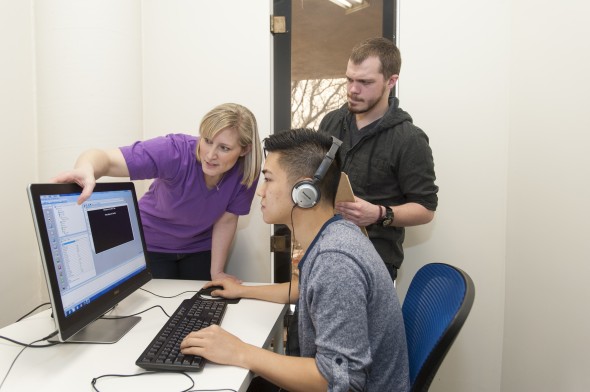
“It’s a good skill if you know how you learn best, as opposed to just trying to cram,” says Kate Brill Schuetz. Photo: Roberta Dupuis-Devlin
It’s critical for undergrads to stay motivated, be ambitious and challenge themselves, Brill-Schuetz says.
“It’s also a good skill if you know how you learn best, as opposed to just trying to cram,” she said.
Brill-Schuetz supervises four undergraduates who collect and analyze data for her cognitive psychology studies on adult second language acquisition. “I try to connect with them and help them to connect to the material,” she said. “It’s important to have a positive relationship and challenge them.”
Brill-Schuetz, who received her bachelor’s in psychology from the Urbana campus, was a high school French teacher for six years in Lansing, Illinois, before joining UIC. Teaching French sparked her interest in studying the cognitive mechanisms that go into learning to speak another language.
She guides her students to devise their own research questions. “They might have a topic but we take it from vague to very specific and practical,” she said.
Brill-Schuetz hopes to continue teaching and research when she finishes her program in December. “I want to stay working as a mentor in some capacity,” she said.
Jada Domingue, doctoral student in physiology and biophysics
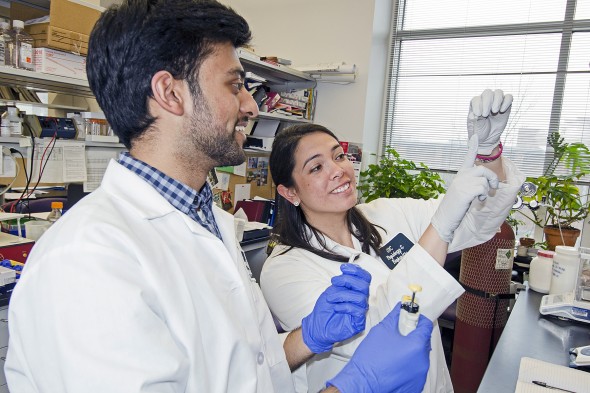
“Being good at one or two things is better than being so-so at 10 things,” says Jada Domingue. Photo: Roberta Dupuis-Devlin
It might sound simple, but the best way to reach undergraduate students is to be approachable, says Domingue.
“I know what they’re going through,” she said. “I feel I really thrived as an undergrad when my mentor was available to answer any questions.”
Domingue and her two undergraduate research assistants study the regulation of ion transport in different types of cells, such as human embryonic kidney cells and colonic cells. “The larger focus of the lab is to better understand the bile acid physiology and the mechanisms behind bile acid-induced diarrhea, inflammation and intestinal discord.”
An important lesson Domingue learned as an undergrad: don’t be discouraged by failed experiments. “It’s not a bad thing – it just means you can eliminate that as a possibility,” she said. “Answering one question always opens the door for many other questions to be answered.”
To be successful, undergrads should stay focused, Domingue said. “I don’t think spreading yourself too thin is a good thing,” she said. “Being good at one or two things is better than being so-so at 10 things.”
Graduate students need perseverance to get to the end of their programs, she said. Domingue plans to finish her program in December, then seek a career in academia. “Getting a Ph.D. is not an easy task,” she said. “You need to commit yourself to your project and seeing it through to the end.”
Leigh Hellman, master’s student in English
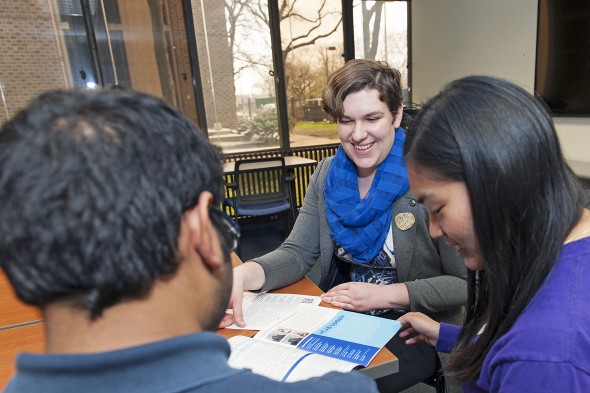
“I respect them enough to give them real-world feedback,” says Leigh Hellman. Photo: Roberta Dupuis-Devlin
Hellman helps student writers find their voice. She is a graduate assistant in the Honors College, mentoring students who write for their five publications: the Ampersand, Asterisk, Journal for Pre-Health Affiliated Students, Red Shoes Review and UIC OneWorld.
“We come to conclusions collaboratively,” she said. “I see myself as someone they can come to for guidance but I create a space where they can have their own ideas.”
Hellman knows what it’s like to be a UIC undergrad — she was one. She graduated with her bachelor’s in English in 2008. Before returning for graduate school, she went to South Korea as a Fulbright Scholar and decided to stay for five years teaching English.
“Undergraduates have a lot of people telling them what to do,” she said. “I really see being a mentor as cultivating an environment where students feel like their voices and decisions have weight and value.”
To be a great writer, it takes practice, she said. “I don’t prescribe to the mentality that writing is an inborn special gift that only a few people have,” she said. “You have to be open to feedback.”
Hellman wants to provide advice that students can learn from when they tackle their next assignment. “I respect them enough to give them real-world feedback,” she said. “Developing your skills as a writer is an lifelong process.”
After Hellman graduates in May, she wants to teach at a community college and continue writing on topics such as living and traveling abroad and issues of race, gender and sexuality. “I want to do something that I’m passionate about and challenges me, which teaching absolutely does,” she said. “And I want to sit down and write and get things published.”
Alex Jendrusina, doctoral student in clinical psychology
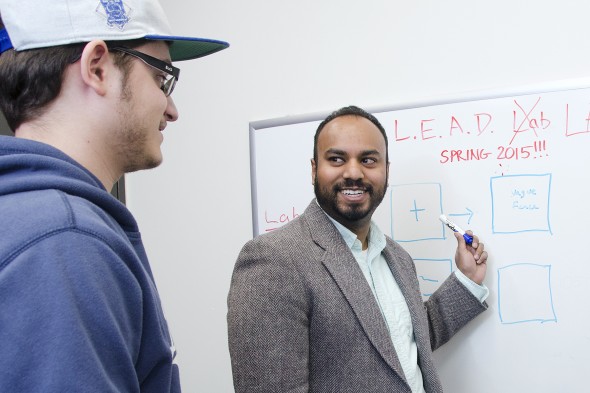
“You don’t have to decide the rest of your life right now,” says Alexander Jendrusina. Photo: Joshua Clark
Jendrusina teaches his undergraduate research assistants that it’s OK to make mistakes.
“Mistakes are learning experiences,” he said. “Research isn’t this perfect thing. I try to create a sense of trust and a warm environment.”
He and his research assistants are collaborating on a computerized visual attention task that assesses cognitive bias related to threats. “Individuals who are anxious might perceive threat more readily,” said Jendrusina, who is in the third year of his six-year program. “We are assessing threat and how people might pay more attention to threatening words rather than neutral words.”
Jendrusina helps students see the bigger picture. “When I was their age, I didn’t know what grad school was like and what types of programs there were,” he said. “I meet with them, see what their goals are and what types of experiences could make them competitive. I advocate for what they want.”
Undergraduate students should keep an open mind when they think about the future, he said. “If you’re not sure what you want to do five years from now, that’s all right,” he said. “It’s OK to pursue what you love, but it’s also OK to not be completely sure of what you want to do.
“The beautiful thing about life is you can change your mind. You don’t have to decide the rest of your life right now.”
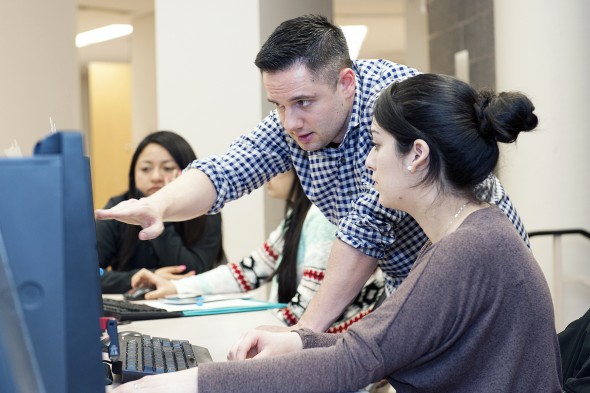
Sean Lee advises his students to stay open to opportunities. “Never say no to anything,” he says. Photo: Roberta Dupuis-Devlin
Sean Lee, doctoral student in public health
As one of the support staff for Psychology 385, Lee helps match about 30 students each semester with a community organization that fits their research interests. “I walk them through the process of developing a project for their match site,” he said. “And I help with the methodology and design so their research is presentable.”
Students work with organizations that address topics such as domestic violence, suicide, immigration or Lee’s own research interest: refugees arriving in Chicago. “I look at people who flee disaster and war zones,” he said. “How they navigate their own health system and how the health system responds to their specific needs at a community level or an ethnic population level. We all have different needs as far as cultural adaptations and navigation.”
Lee, who wants to work abroad in human services when he finishes his program in December, advises his students to take all opportunities that come their way.
“Never say no to anything,” he said. “There are a lot of really menial things you can be offered that you might think are a waste of your time but as you get involved, you can see other parts of the organization to get involved with. It always snowballs into something else.”
